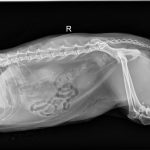I would say get your vet involved, and/or a veterinary dietician if there’s one near you. There’s a lot more leeway with dogs than with cats, but I’d be very careful about making sure they get the right balance of nutrition without overdosing them on anything.
Oh, avoid legumes. There’s a link between heavy legume inclusion and dilated cardiomyopathy, which is something I wouldn’t wish on anyone.
Lots of folks go with a raw diet. This seems to be somewhat controversial in vet circles (Dr. Magnifico will weigh in on this when she sees it), but it’s another feeding method that requires a lot of research first.












I can’t fathom what this might be, though a toxicity comes to mind. Definitely get her to the vet.